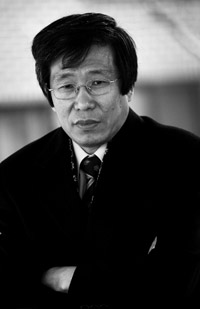 By Kim Seong-kon, Professor of English Literature
By Kim Seong-kon, Professor of English LiteratureMany foreigners who live in Korea are surprised to find the lack of law enforcement in today's society.
For example, we see so many cars parked illegally near fire hydrants, at the intersections, or at the corners of the road, blocking the sight of approaching drivers. Few of them, however, are ticketed or towed.
As a result, some people unabashedly practice illegal parking whenever possible. When there is a wedding ceremony at a church or a wedding hall, illegally parked cars frequently occupy one lane of the street.
Illegal cutting-in is also being widely practiced, even in expressways. For example, when you take the expressway to shop at the Costco or E-Mart located at Yangjae, you may often find cars queuing up, not only on the exit lane but also on the fourth lane next to it, making a full stop on the expressway. On the opposite side of the expressway, many impudent drivers keep cutting in to take the Seocho exit. Nothing is more exasperating than seeing other drivers continuously cut in while you have been waiting bumper to bumper for more than 10 minutes to exit.
Using mobile phones while driving is prohibited, too, and yet we see quite a few drivers leisurely talk on their cell phones in a slow-moving vehicle, seriously hampering the flow of traffic.
Perhaps their mentality is:"There are no traffic cops around, so why not use your cell?" Few drivers seem to heed the right-of-way either. Instead, they try to squeeze into the same lane at the same time regardless of the traffic lights. It seems that police officers do not issue a ticket to such a minor violation. It is only natural, then, that traffic accidents and bottlenecks are so rampant, and so frequent in our society.
Andrea Butler, who lives in Korea, recently wrote me about this embarrassing phenomenon:"It is a common egotistical paradox that if everyone operates with a 'me first' mentality, the result is that nothing moves. Common courtesy and respect for the law go a long way, but if the community at large lacks both, then what can be done?"
As she pointed out, we need rationality, common sense and common courtesy in order to become good drivers. We should abide traffic laws, which should be enforced strictly. In the United States, for example, police patrol cars almost always make the drivers on the road shudder. In Korea, however, few drivers seem afraid of police cars that seldom issue speeding tickets. Butler pointed out this strange phenomenon, saying:"The fear of being pulled over by a traffic cop is one that people in Korea simply don't have."
In order to make people abide by traffic laws, the ramifications of illegal parking, drunk driving or ignoring a red light should be severe. In big cities in the States, you will be fined as much as $400 for speeding or running a red light, and you may be prosecuted for reckless or drunk driving that endangers people's lives. In Korea, however, the fine for speeding ranges from $45 to $60 only and the penalty for driving drunk is usually suspension or revocation of your driver license.
In a society where laws are not enforced strictly you cannot expect rationality and common courtesy to prevail. Since you do not fear the ramifications of breaking laws, which are not severe, you can easily park illegally, drive under intoxication, or physically assault a lawmaker in broad daylight, which actually happened a few weeks ago. You can also set up illegal demonstrations, beat up law enforcement officers and think you can get away unpunished.
In a society where"law and order" is not imposed strictly, food manufacturers will continue to tamper with the food we consume daily. Unless severely punished, these malicious, materialistic people will keep manufacturing harmful food that will endanger the health and lives of our children. We can never eradicate hazardous food and its manufacturers simply with ex post facto fines. Those who manufacture unsanitary, harmful food to make profit must be punished severely under the charge of attempted mass murder. Then nobody would dare to make and sell unsafe food.
It is all up to the competence of the Lee administration. First of all, President Lee Myung-bak should beef up the police force to maintain law and order. Needless to say, we must observe the law and respect law enforcement officers. Most Koreans are law-abiding, good citizens. The problem is those who defy the law without remorse. If our political leaders, intimidated by those outlaws who stage illegal demonstrations, assault police officers and overthrow the government cannot enforce laws, their incompetence will exacerbate the problem. Anyone who breaks the law should be punished. Only then can law and order be restored in our society.

